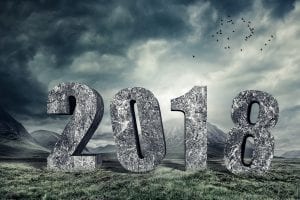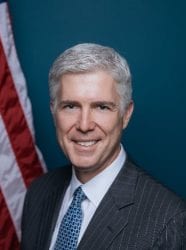Copyright and Plagiarism in 2018 (And 2017)
New year... New predictions.
 Back in 2016, I started my tradition of starting every new year with a look back at the previous one and a look ahead to the one to come. It’s a tradition I continued in 2017 and one that I’m continuing now in 2018.
Back in 2016, I started my tradition of starting every new year with a look back at the previous one and a look ahead to the one to come. It’s a tradition I continued in 2017 and one that I’m continuing now in 2018.
But 2017 was nothing if not an unusual year. It was a year of (mostly pointless) plagiarism scandals, insane lawsuits and a lot of vitriol. Having been involved in plagiarism and copyright issues since the early 2000s, I can’t remember a time with so much heated debate without some kind of massive public controversy, such as the SOPA/PIPA protests.
A lot of that stems from the broader political climate, but it also stems from how we’ve seen copyright and plagiarism in the news. Questionable lawsuits and the weaponization of plagiarism make it so that these issues have become as much about hurting others as they have protecting one’s work or preserving originality.
All of that makes this a very thorny year to recap and one that, in many ways, I’m eager to get into the books and move on front.
Still, with that in mind, here’s a look back at the year that was and what it meant to copyright and plagiarism.
5 Copyright and Plagiarism Keys from 2017
 Looking back over the year, it’s tough to pick out a key stories or series of stories. Instead, it seemed to be a year that we bounced from controversy to controversy, each bubbling up and fading away just as quickly as the last.
Looking back over the year, it’s tough to pick out a key stories or series of stories. Instead, it seemed to be a year that we bounced from controversy to controversy, each bubbling up and fading away just as quickly as the last.
Still, there were some overarching themes that are well worth exploring.
- The Weaponization of Plagiarism: We talked about it in a December post but it bears repeating, 2017 was the year that plagiarism became fully weaponized. The number of scandals is simply too many too count. Sure, 2016 started out hot with a deluge of plagiarism stories but 2017 was a constant stream of plagiarism stories, mostly accusations of plagiarism against prominent figures. They included Neil Gorsuch, David Clarke, Marine Le Pen, Rev. Bill Shillady and multiple allegations against the Trump administration. What they all had in common is they were allegations from political opponents attempting to discredit their foes. While some of the allegations had weight, such as the Monica Crowley story, most did not. However, that didn’t stop the use of plagiarism as a weapon, something we should all be worried about.
- The Year of Stupid Copyright Litigation: In my 2016 wrap up, I said it was a year where boundaries were tested and gray areas of copyright were explored. 2017 was not like that. Sure, there was plenty of great copyright litigation but the headlines were dominated by less productive lawsuits. This included VidAngel trying (and failing) to convince a court it’s unlicensed streaming service was legal, Matt Hoss suing (and losing to) H3H3 over criticism, a New Zealand political party trying (and failing) to convince a court it’s obvious Eminem rip off wasn’t an infringement and PETA attempting (and failing) to convince a court a monkey can hold a copyright. Despite some great litigation taking place, copyright litigation news was, on the whole, cringe-worthy in 2017.
- The Year Journalism Surrendered: Journalism has long been the bastion for plagiarism ethics, despite the cries of “fake news” most mainstream publications, large and small, strive every day to report accurately and fairly. However, that reputation was heavily undermined in 2017. In March, Benny Johnson, who had previously been fired from Buzzfeed for plagiarism in 2014, found himself in another ethics scandal, this time at the Independent Journal Review. He was fired from there only to land yet another gig, this time at the Daily Caller. But, while Johnson is certainly the most egregious example, 2017 was also the year the New York Times (and many other publications) eliminated the public editor position due to financial pressure. Once the representative for the public in the newsroom and the defender of ethics (one launched into the mainstream by the Jayson Blair scandal), the position is waning at a time where journalism’s credibility is under attack.
- The Changing Face of Piracy: Piracy has never been a static thing and 2017 highlighted that. BitTorrent, once the favorite tool of pirates, has been in a long, slow decline for years. In it’s place streaming services have been slowly taking over and, in 2017, they took the spotlight. This was primarily in the form of conversations about Kodi boxes, set-top boxes similar to Apple TV’s or Roku’s that, when loaded with 3rd-party extensions, enable easy access to infringing content. This shift in piracy means that the methods for fighting infringement have to change as well. We’ve seen that this year with several Kodi developers facing legal action, but it’s clear that the tactics to fight infringement are still evolving.
- The Battle Against Essay Mills: On the plagiarism side, essay mills, sites that write school assignments for pay, were in the forefront. This is especially true internationally with the UK creating a plan for legislation to crack down on such sites and also encouraging universities to block such sites from their networks. The essay mills have also worked hard to make themselves known, turning to Twitter bot armies to peddle their wares and the war between school and essay mill has ramped up. However, this battle may be something of a red herring as studies show that the vast majority of students who pay for a written paper don’t do so through a website, but through a friend or classmate.
All in all, 2017 was an unusually wild year for copyright and plagiarism news. However, a lot of it was frustrating. With scandals that were more molehills than mountains, and copyright lawsuits that were more zany that practical.
It was a crazy year, but not necessarily in the fun or interesting way. In many ways, it was a year with a lot of smoke, but not a lot of fire.
Copyright and Plagiarism in 2018
 How do you follow up a year like 2017? I’m honestly not sure. In all the years I’ve been doing this it was truly a standout year. Insane lawsuits, countless minor plagiarism scandals and the list goes on.
How do you follow up a year like 2017? I’m honestly not sure. In all the years I’ve been doing this it was truly a standout year. Insane lawsuits, countless minor plagiarism scandals and the list goes on.
The main question I have is “Will 2018 be even more crazy?” and that I honestly don’t know. While part of me hopes that 2017 was peak crazy, the realist in me doubts it.
So, while 2018 promises to be another wild ride, there are a few things that we can probably expect to happen.
- AI Impacts Both Copyright and Plagiarism: AI has been a tech buzzword for some time but we’re finally starting to see the fruits of the AI labors. Bots already control much of what you see and do online and, soon, they may control much of how you create and how you plagiarize. This came into the spotlight some in 2017 due to a paper published on automated paraphrasing and an article about students using Wolfram Alpha to “cheat” in math class. However, this is the tip of the iceberg. The Washington Post already has an AI reporter, how long before students have AI ghostwriters? This issues will also impact copyright as issues about who owns what an AI produces will likely be raised, but not resolved, in the new year.
- More Weaponized Plagiarism: 2017 was a banner year for weaponized plagiarism but 2018 is an election year in the United States. Given the stakes and the national attention put on nearly every race, it’s inevitable we’re going to see more plagiarism scandals. How many will actually be serious we’ll have to see, but I fully expect the plagiarism hunters to be aggressively looking at nearly every candidate in hopes of finding something to make a story out of.
- Ad Blocking Back in the Spotlight: To be fair, ad blocking has never really left the spotlight. 2017 was the year of the ad blocking DMCA debacle which saw an anti-ad blocking firm file a DMCA takedown notice against an ad blocking list. However, as creators explore new ways to exploit free content, such as cryptocurrency miners, ad blocking is going to be a front-seat issue again. This is compounded by the fact that online ads have been earning less than normal, as seen with the YouTube Adpocalypse, and the stage is set for a fresh war over ad blocking. With visitors feeling further encroached and creators feeling that their backs are to a wall, the stage is set for another round in this fight.
- More Legislative Uncertainty: Last year I predicted that we would see government uncertainty when it comes to copyright. I was unusually right with that prediction (though I completely blew prediction #5 last year). For example, despite an early push to pass a bill that would allow the President to appoint the Register of Copyrights, the bill has since stalled in the Senate. With 2018 being an election year and Congresspersons taking time away to campaign, we’re unlikely to see significant forward momentum on copyright issues. This is despite the fact there are key issues to consider, such as modernization of the copyright office and streamlining music licensing.
- The Great DMCA Debate: The U.S. Copyright Office is slated to take up two separate DMCA-related issues in 2018. The first being a much-anticipated report on the effectiveness of the DMCA safe harbor provisions and the second it’s triennial rulemaking on exemptions to the DMCA provisions against circumventing technological measures to control access to copyrighted works (DRM). Both are likely to spur heated debates about the DMCA. No matter what comes out of these processes they will be controversial and they will be deeply contested so expect a lot of discussion about the DMCA in 2018.
So, while 2018 may be a year that, in many ways, is more crazy than 2017, it’s also likely to return to some of the old, familiar conversations. However, as long as Congress is as deadlocked as it is, it’s unlikely that anything legislative will come from those conversations, at least not until next year.
Bottom Line
At the end of this post last year I said that I couldn’t think of a single year that began with more uncertainty than 2017. I think I’d say the same for 2018.
Even if we just look at the things we do know for certain, it’s likely to be a wild and active year for both plagiarism and copyright. While that activity may not be legislative, it will be important nonetheless.
In the meantime, if you want some additional thoughts into what 2018 will mean for copyright, Terry Hart at CopyHype has, once again, written a thorough analysis. It’s definitely worth checking out.
Beyond that, there’s nothing left to say other than happy 2018 and that I’m looking forward on experiencing the new year with all of you.
Want to Reuse or Republish this Content?
If you want to feature this article in your site, classroom or elsewhere, just let us know! We usually grant permission within 24 hours.
